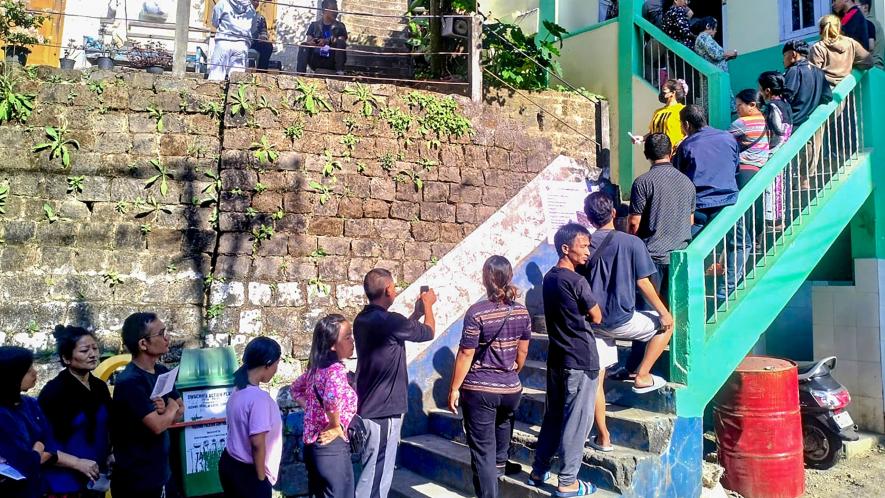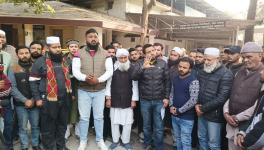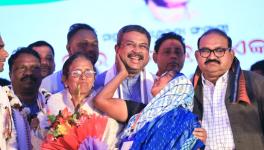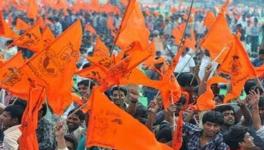Mizoram Elections: Will the Indignation Bring Landmark Change, and how are Elections Special in the state?

Voters wait in a queue to cast their votes for Mizoram Assembly elections, in Aizawl, Tuesday, Nov. 7, 2023. Image Courtesy: PTI
In the first phase of the state Assembly elections of this year, Mizoram, along with Chattisgarh, is voting on November 7. Just a few months ahead of the 2024 General election, the state Assembly elections are certainly crucial, and Mizoram stands at a crossroads—whether it would go for landmark change in the political history of the state or continue with the status quo. Mizoram has a long history of a binary political system, where only the MNF (Mizo National Front) or the Congress has formed governments. But this time, the emergence of the third front, ZPM (Zoram People’s Movement), has challenged the two-party system of the state.
While speculating about the election dynamics, one cannot ignore the election system of Mizoram, which is unmatching with any other state of India. The cardinal role played by the MPF (Mizoram People’s Forum) is to not let the election campaigns go in an indecent manner.
NewsClick spoke to one general secretary of the MPF, Dr JC Zomuanthanga, to take an account of the peculiar norms of election campaigns in Mizoram and to Dr Suwa Lal Jangu, who is an assistant professor of Mizoram University and a critical observer of the state politics to opine on the election dynamics and the state politics as well.
Election Historical for all Parties
On being asked how he sees the election dynamics in the state, Jangu highlighted three perspectives— political, social and economic.
“On the political front, the big question is whether the two-party system in Mizoram will continue or there will be a change with the rise of the third front,” he said.
Jangu categorically mentioned that the election, this time, is a competition between the MNF and ZPM primarily.
“From a societal perspective, I would like to say that this election has the background of ‘Zo’ ethnic unity, or the Mizo nationalism, based on Mizo-Zo ethnic unity. Whether the society will accept this or reject it for deciding an election outcome must be seen,” Jangu said.
If MNF loses the election, then it will be like the society has rejected nationalism for deciding the election outcome, he hinted.
From the economic perspective, Jangu said that Congress, MNF and ZPM are similar on the socio-economic agenda; only the name and policy are changed. The framework or contents are the same, he opined.
“At the national level, there is Hindu Nationalism represented by the BJP, and in the state, there is the Mizo nationalism led by the MNF. So, the election will also witness a clash between these two nationalism. The election result will also reflect whether Hindu nationalism is accepted politically or rejected. If MNF wins, it will be like working together with the Hindu nationalism as MNF will be with the BJP,” Jangu said.
Upon questioning how he sees the situation if the ZPM wins this time, especially from the perspective of nationalism, Jangu said, “ZPM is still a new party, just five years old. And it is not seen as the champion of the Mizo nationalism. It is still the MNF that is considered the hero of the Mizo nationalism.”
“If the ZPM wins, it will not be like an ideological win; rather, it will be socio-economic acceptance of the new party. If the Mizos chose ZPM, then it is because the party is seen as an alternative to the Congress. A ZPM win will not mean people have replaced the Mizo nationalist leadership with it,” Jangu emphasised.
In the previous election, ZPM won most of its seats in urban areas. Will it be able to expand its reach to the rural areas as well, because desiring to the level of forming the government, the party will necessarily need to expand from its comfort zone? On this, Jangu opined, “Yes, the core vote bank of the ZPM is youth and new voters, which are more in urban areas. In the last election, ZPM won seven seats and one they lost in a by-election. So, out of six now, five were from Aizawl.”
“The party supremo Lalduhoma won from Serchhip, and in the recent municipal election in Lunglei, the ZPM swept. So, even now, ZPM’s core vote bank is urban-centric. I think in rural areas, it is mainly Congress versus MNF.”
“The Aizawl city areas have 13 Assembly seats, and ZPM is dominant in 11. In the Lunglei district, there are five seats, and ZPM has a better chance there. In Serchiip district, out of three seats, ZPM stands a fair chance of winning two,” Jangu said.
“In rural areas, there are not enough ‘neutral’ voters; they are mostly the hard-core voters or party-centric voters. But in some areas, votes will be divided between the Congress and the ZPM,” he explained.
A lot has been said about the BJP’s tactic of wooing the ethnic minority voters of Mizoram, which might increase their numbers. But the question is whether this can be seen as a divisive political tactic.
“BJP may improve this time. The BJP will win in at least two seats. In 2018, BJP won one seat and was in second position in two seats, and in another one, the party turned out to be the third one.”
“BJP’s acceptance amongst the minority communities in Mizoram is increasing. In the Marah (an ethnic minority community in Mizoram) areas, the fight is between the Congress and BJP. Similarly, in Chakma areas, the fight is between BJP and MNF.”
“Wherever it is Congress versus BJP, the BJP has a better chance, and where it is BJP versus the MNF, the MNF has a better chance,” Jangu opines.
The Way the MPF Functions and How it Influences Elections
The MPF had a significant role in the Mizoram election. It is parallel to the ECI (Election Commission of India) for strictly following the codes of conduct. However, the MPF is socially deep-rooted, and an announcement against any candidate will invite voluntary social rejection.
All the political parties in Mizoram signed an agreement with the codes of conduct laid by the MPF. Violating any code is investigated by the MPF, and in case anyone continues with the violation, the MPF gives public announcements about the misdeeds of any candidate or party.
The MPF codes of conduct also say that there is no door-to-door campaign after the ECI announces the election dates; only street meetings and local meetings are allowed. Everyone across Mizoram follows this. Cars with loud music campaigning for candidates are also not permitted, and one feels it is travelling through the state even just a couple of days before the polling.
Dr JC Zomuanthanga, assistant professor of Mizoram University and a secretary of MPF, spoke to NewsClick to explain how the forum works. He explained that the organizational structure of MPF has a general headquarters at the top. From this, constituency-level committees are formed, which again have local-level forums. Any complaint that anyone, whether voters or contenders, wants to raise against anybody can be done through the local forum.
“The MPF is a conglomeration of different churches in Mizoram with the Synod (one of the constituent bodies of the General Assembly of the Presbyterian Church of India) as the largest denomination,” Zomuanthanga.
“The general headquarters has a president, three general secretaries and a treasurer. In every constituency, the MPF has secretaries and local forums (like committees). I am the secretary to the Aizawl 2 west constituency.”
“As the MPF is rooted in the church and the Synod is the largest denomination, the Synod head is the moderator of the MPF,” Zomuanthanga said.
Common Platform System by MPF
There is another unique electoral process in Mizoram, and that is the common platform. The MPF organises a common platform in every constituency where all the contenders are invited to give their speeches.
“Everyone is given exactly equal time, and the audience present can question all of them,” Zomuanthanga said.
“It is more effective than the bustles of the rowdy election campaigns we generally see in the country. These people can ask questions to the candidates, and they are compelled to answer,” said a local in Aizawl.
“If anyone violates the MPF, they are boycotted in the election. Everyone respects the MPF.”
“This time, the door-to-door campaigns have been stopped since October 8, when the ECI announced the dates. Street campaigns are allowed, but under the supervision of the local MPF,” Zomuanthanga said.
Get the latest reports & analysis with people's perspective on Protests, movements & deep analytical videos, discussions of the current affairs in your Telegram app. Subscribe to NewsClick's Telegram channel & get Real-Time updates on stories, as they get published on our website.























